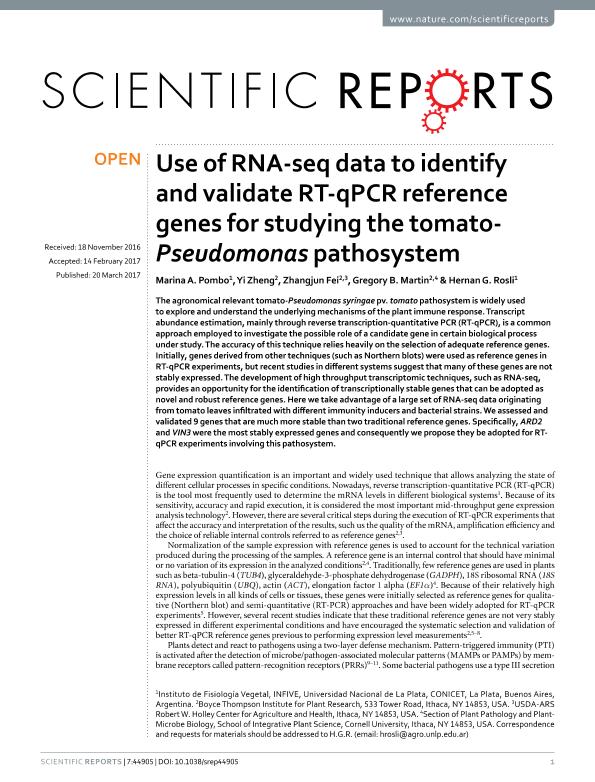Artículo
Use of RNA-seq data to identify and validate RT-qPCR reference genes for studying the tomato-Pseudomonas pathosystem
Fecha de publicación:
03/2017
Editorial:
Nature Publishing Group
Revista:
Scientific Reports
ISSN:
2045-2322
Idioma:
Inglés
Tipo de recurso:
Artículo publicado
Clasificación temática:
Resumen
The agronomical relevant tomato-Pseudomonas syringae pv. tomato pathosystem is widely used to explore and understand the underlying mechanisms of the plant immune response. Transcript abundance estimation, mainly through reverse transcription-quantitative PCR (RT-qPCR), is a common approach employed to investigate the possible role of a candidate gene in certain biological process under study. The accuracy of this technique relies heavily on the selection of adequate reference genes. Initially, genes derived from other techniques (such as Northern blots) were used as reference genes in RT-qPCR experiments, but recent studies in different systems suggest that many of these genes are not stably expressed. The development of high throughput transcriptomic techniques, such as RNA-seq, provides an opportunity for the identification of transcriptionally stable genes that can be adopted as novel and robust reference genes. Here we take advantage of a large set of RNA-seq data originating from tomato leaves infiltrated with different immunity inducers and bacterial strains. We assessed and validated 9 genes that are much more stable than two traditional reference genes. Specifically, ARD2 and VIN3 were the most stably expressed genes and consequently we propose they be adopted for RT-qPCR experiments involving this pathosystem.
Palabras clave:
Rt-Qpcr
,
Reference
,
Rna-Seq
,
Tomato
,
Pseudomonas Syringae
,
Plant Immunity
Archivos asociados
Licencia
Identificadores
Colecciones
Articulos(INFIVE)
Articulos de INST.DE FISIOLOGIA VEGETAL
Articulos de INST.DE FISIOLOGIA VEGETAL
Citación
Pombo, Marina Alejandra; Zheng, Yi; Fei, Zhangjun; Martin, Gregory B.; Rosli, Hernan Guillermo; Use of RNA-seq data to identify and validate RT-qPCR reference genes for studying the tomato-Pseudomonas pathosystem; Nature Publishing Group; Scientific Reports; 7; 3-2017; 1-11; 44905
Compartir
Altmétricas




